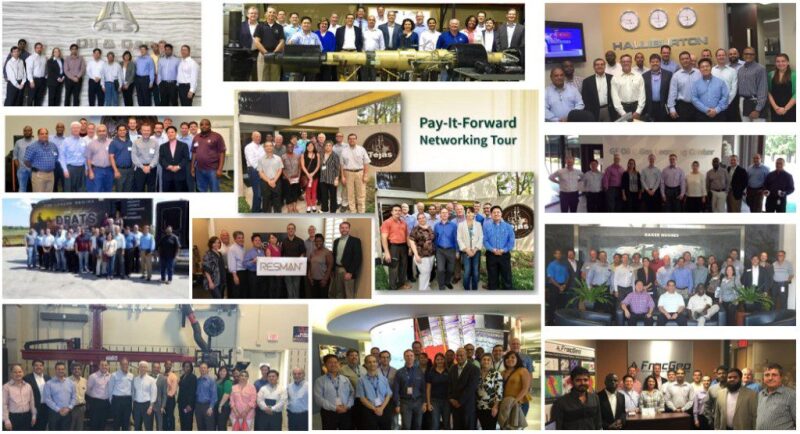For those who are in a job transition, networking enhances job search leads because it involves meeting new people and becoming reacquainted with industry colleagues. However, as author James Clear states, “The goal of networking should be to help other people. … [and] It’s far more important to understand other people’s needs before you tell them about your needs.” Carlos Pineda shares in his LinkedIn article that the guiding principle “Let each of you look not only to his own interests, but also to the interests of others” has been the model for the “Pay-it-Forward Networking Program” from the very beginning.
And according to author Stefan Stern, one of the key tenets of networking is that it increases reciprocity. “It is that exchange of mutually beneficial information that helps to establish long-lasting professional relationships and even friendships. … It is about shared interests.” The Pay-It-Forward Networking Program embodies these principles and puts them into practice to help and encourage those in career transition in the oil and gas industry.
Pay-It-Forward Networking Concepts
With the intention to help lead and grow a grassroots volunteer program to assist professionals in transition in Houston, SPE member Carlos Pineda started the Pay-it-Forward Networking Programs with the simple notion of wanting to help and encourage others during his own career transition. Many others supported this initiative, including but not limited to the authors of this article.
The program offers three key opportunities for networking.
"Pay-it-Forward Networking Tours." A unique initiative that encourages companies to open their doors to visits by unemployed professionals. Companies get the opportunity to showcase their products and capabilities to highly qualified professionals who could become their customers or employees in the future; tour participants stay up to date on the latest technologies. This is an encouraging and uplifting experience for all involved. While anyone can help, the guidelines include that company tour events can only be attended by members in transition.
More than 180 professionals have completed 51 tours (close to 600 participants in total) since the program began in April.
“Pay-it-Forward Training.” The initiative to host training followed on the success of the tours. Recognizing the caliber of talent in the network, the program organized venues for members to share their expertise with others. The first 4-hour sessions of training featured a completions expert and a geologist presenting an “Overview of Multistage Completions for Hydraulic Fracturing.” Everyone is invited to attend, help, and train in these events, both professionals in transition and people in the workforce.
Twelve volunteer subject matter experts have provided training to more than 400 professionals since mid-September on a variety of technical and entrepreneurial topics. You can find all the Pay-It-Forward Training seminars on www.Eventbrite.com by typing “Pay It Forward” in the search box.
“Pay-it-Forward Panel.” The panels offer advisors to help companies that need outside perspectives for specific problems. The companies win by getting nonbiased, outside-the-box insights that could lead to breakthrough innovations. The in-transition panelists win by contributing and demonstrating expertise, and building relationships with companies and the industry’s forward thinkers. We have already offered valuable advice to improve a new downhole tool, now being piloted by several operators.
The common thread in all the elements of the Pay-It-Forward Program is providing an opportunity to help and encourage others. There is no expected immediate payback directly from any tour, training session, or panel. We are driven to use our time on the sidelines to help maintain our expertise, support our employed colleagues, and provide encouragement during what can be a trying time during the downturn.
Thomas Chistensen, who participated in the program’s activities, shares his experience:
Participating in the Pay-It-Forward During the Downturn program as a person in transition has been a great opportunity. Learning about products and services offered by the participating companies is a great experience. For those that have not been exposed to these companies in the past, the knowledge will carry into the future of all the participants and be a valuable resource when the next challenges appear. Visiting with companies has also provided an indication that there is still activity in the oil and gas industry with expectations that activity will return in the future.
We ask TWA readers who are employed in the Houston area to consider hosting a tour at your company or engaging a panel. Please write to us if you wish to be involved. Readers who are in transition are invited to learn more about the program as well, and how they can contribute to its success.
After being launched by Pineda, the Pay-It-Forward Program is in the process of being integrated into the SPE Gulf Coast Section’s (GCS) Members in Transition (MiT) initiative. The SPE-GCS MiT initiative is designed to:
- Disseminate best practices in career planning, job search, entrepreneurship, and innovation
- Provide SPE’s support to those in transition
- Encourage networking between SPE members to build mutually beneficial relationships
The following programs are included in the SPE-GCS MiT initiative:
- Seminar Series, offering three speakers in monthly, half-day seminars
- Access to free computer software licenses and software training
- Job Search Work Team, which meets weekly and ensures accountability in job search. (The job search work teams are groups of 6 to12 people who meet weekly to work on their job searches together—a concept based on Orville Pierson’s books on job search.
- Ideas Launch Pad, which encourages technology entrepreneurship in partnership with the Houston Technology Center
- Pay-It-Forward Networking tours, training, and panels
- A career fair scheduled for first quarter 2017
For more details about SPE GCS MiT programs and a process guide for “How To Start a MiT Program in Your SPE Section,” visit here.

